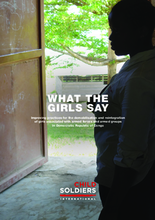Introduction & Methodology
This report presents the findings of research conducted by Child Soldiers International to assess the effectiveness of release, psychosocial recovery and reintegration interventions (commonly referred to as ‘DDR’) for girls associated with armed groups in eastern Democratic Republic of Congo (DRC). More specifically, it seeks to shed some light on the extent to which girls have been reached by DDR programmes, and on the appropriateness of this support where it was offered, mostly from the point of view of the girls themselves.
It is important to note that the objective of the report is not to provide an overall assessment of all DDR programmes for girls in eastern DRC, but to convey the perspective of girls formerly associated with armed groups in exploring and exposing some of the reasons why many are still not receiving appropriate assistance.
Child Soldiers International developed the framework for the research, using information gathered over 10 years of research and advocacy work in DRC1 ; recommendations made by the Committee on the Rights of the Child to the DRC government in February 20122 ; and extensive consultations with Congolese non-governmental organisations (NGOs)3 .
Our research team spent six weeks in South Kivu, North Kivu and HautUélé provinces in January-February 2016 and interviewed: 150 girls formerly associated with armed groups4 ; 89 members of communitybased child protection networks (known as “RECOPE”5 ); 12 teachers and school principals; 8 religious leaders; 14 local authority officials; and 46 DDR actors (see Annex II).
In October 2016, Child Soldiers International coordinated a postresearch workshop for DDR providers in eastern DRC, including those who participated in the study. The objective of the workshop, held in Goma (North Kivu), was to present the research findings and discuss practical steps to improve DDR assistance based on what we learned from the girls. Participants unanimously agreed that Child Soldiers International should develop a Practical Guide designed to support the release and reintegration of girls associated with armed groups through concrete and mainly low-cost interventions at the community level. These interventions were shared and discussed by participants at the workshop and based on their joint experiences and good practices. We have since developed this guide (see Annex I).
Connections to care
Findings from the report suggests reintegration assistance is largely targeted toward boys, and programmes have systematically failed to reach girls formerly associated with armed groups. Upon return home, most girls experienced humiliation, discrimination and rejection from their families, friends neighbors or teachers; some were forced to beg for shelter after being rejected by their families.
The report also discusses girls' experience of interim care prior to reunifying with their families, finding that those who spent time in foster families, rather than transit centres, or "CTOS," were unanimously positive about their experiences and had more success reintegrating back into their homes and communities. In many circumstances, however, interim care had been used unnecessarily and inappropriately. Of the 25 girls interviewed who were placed in care, 21 had been transferred into care after being reunified with their families. The report recommends working with families and communities to support the reintegration of girls, rather than offering services to girls exclusively in the context of interim care.
To access the practical guide published with this report, please click here.

